Heighington Millfields Primary School
It took us a little while to get in to the school but after we managed to make our way past reception we were greeted with the whole student body ready for an assembly. Luckily we had been preparing for this and had our presentation all ready to go. A few teething problems with video were solved by Tom, a student, and we were set to go. After the children filed in they sat and we were introduced as Mike and Malika! The students then sang a song to start their day including lyrics about how life was a wonderful thing. Then we started.
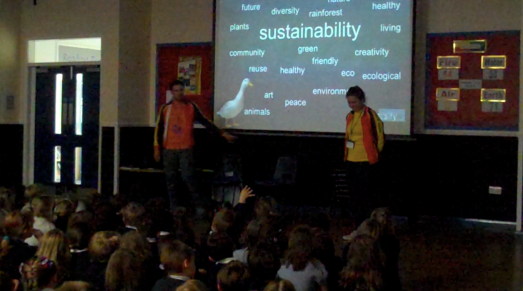
It was a fun assembly with interactive games being played with two teams made up of 100 students each. We learnt about how long a plastic bag takes to decay (an important fact that the head teacher reiterated with some aplomb at the end of the assembly) and about the world’s resources leading to the importance of sustainable actions. We of course left them in knots and fits of giggles having played the interconnected game of hope.

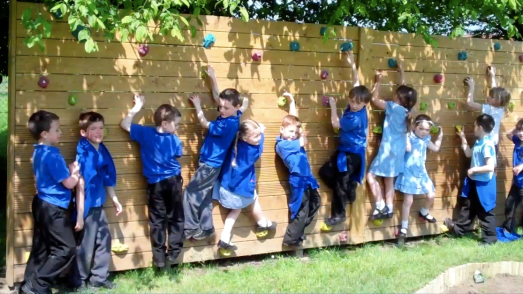 We asked the class to think about where the heart of the school was for them; where did they enjoy being and like to go. The children started talking about parts of the garden including the climbing wall, story circle, wind chimes, stage area, football field and well established willow dome. They had just installed with the help of the Co-operative (who are SEEd members), a mini-Welbourn in their playground to the side of the football field. We were also informed that they had just started work on developing food growing allotments and a reflective area requested and designed by the students. This is a first as we have not come across ‘reflective areas’ before in our travels and I think they are so important for students.
We asked the class to think about where the heart of the school was for them; where did they enjoy being and like to go. The children started talking about parts of the garden including the climbing wall, story circle, wind chimes, stage area, football field and well established willow dome. They had just installed with the help of the Co-operative (who are SEEd members), a mini-Welbourn in their playground to the side of the football field. We were also informed that they had just started work on developing food growing allotments and a reflective area requested and designed by the students. This is a first as we have not come across ‘reflective areas’ before in our travels and I think they are so important for students.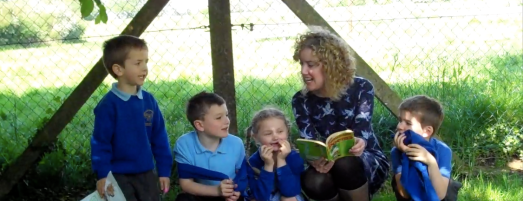
Harlaxton Primary School
We stayed with the class teacher here in the lovely village of Harlaxton, situated apparently in the middle of a chessboard. The original buildings in the village have representations of chess pieces on their chimneys and was next to the amazing Gregory Hall.
The day’s session started with an assembly, that we recorded, as a main feature was the awarding of Bikeability certificates to students having just passed their training. These acted as a real celebration of their hard work.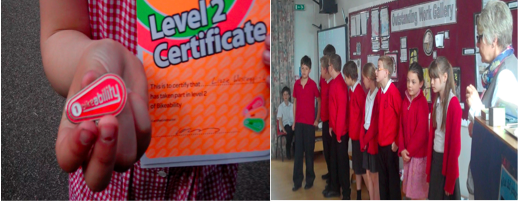
We captured the students’ work including their allotment, here they grew their own food used in their schools meals. The work was spearheaded by the school’s (cycling enthusiast) administrator who sat in here office next to the DCSF doorways poster (add link) and who was an obvious favourite of the students.
Winchelsea Primary School, Ruskington
We started the day cycling from an unusual tent pitch to hear about Winchelsea’s work from the head teacher and student body. The work around sustainability really started here to bring spending back on track. When head teacher Helen Duckett took over 2 years ago the school was in debt and she admitted that this was the initial incentive to start work with sustainability. By making the school more eco friendly she has turned the deficit around and now the school continues to be sustainable but now for more familiar environmental reasons.
Our interview with head teacher Mrs Duckett started with her admitting that she didn’t quite know if the school was connected or doing anything with sustainability but by the time the interview finished she was brimming with ideas, making the connections and thanked us for our help as she said it would help her with her coming Ofsted inspection.
Throughout the day we continued to find out about all the stuff they collect, recycle and reuse at the school from shoes, stamps to yogurt pots to sell seedlings in and to clothing.
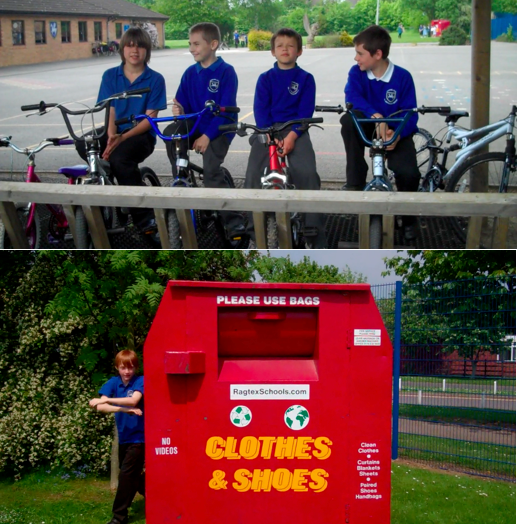
Browns Primary School
Browns Primary School in Horblings was our last school of the week. Working with year 6 we were impressed by their ability to articulate their thoughts about sustainability, to think ahead and make connections. The students worked on creating their school stories featuring their school pond, conservation area, recycling and food-growing scheme. A few students became ducky’s new best friends and gave him a part in their film.
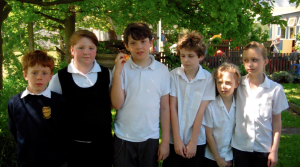
Altogether it was a glorious week of fun in the sun and we can’t believe that we only have one more week to go before we are cycling home to London! How time flies when you are having fun!
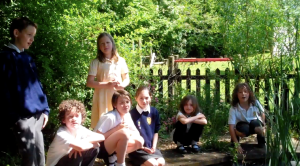
Halton Holegate
Waking early enough to feel like we were in a cloud to ride 10 miles to Spilsby could not have been more enjoyable as the sun eventually burnt through and the roads proved to be minor, quiet and flat. With the head teacher and year sixth in Poland to learn about sustainability and its impact in another country, we gave a whole school assembly to a slightly smaller audience than normal. The students present made up for their friends’ absences by being extra participatory and eager to share their thoughts about sustainability.
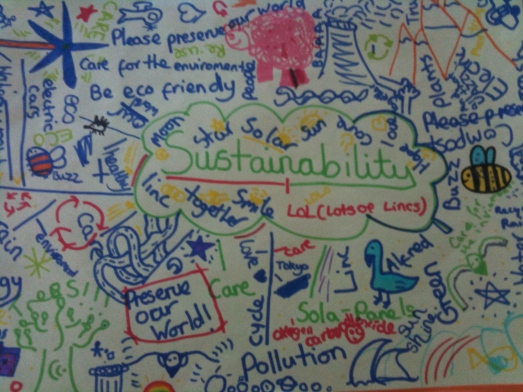
Our following session with years 3/4/5/ lasted almost 3 hours as the students wanted to capture all the great work they are doing to take care of the environment. And they are doing a lot! When they split into groups to capture different areas we had groups reporting on food growing, water cycle systems, ponds and wildlife, bug, bee and hedgehog houses and eco-committee explaining all their hard work and achievements.
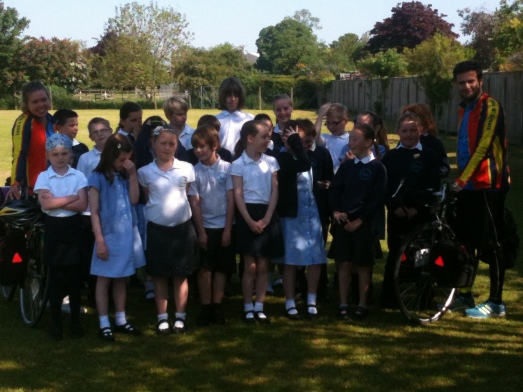 The cameraman from the local newspaper even showed up for a quick photo and to show the importance of the schools work before we waved goodbye and cycled away in the boiling heat. Onwards to Spalding! Every pedal takes us closer to the finishing line. A hasty chalk line is being drawn on Parliament Hill as we type.
The cameraman from the local newspaper even showed up for a quick photo and to show the importance of the schools work before we waved goodbye and cycled away in the boiling heat. Onwards to Spalding! Every pedal takes us closer to the finishing line. A hasty chalk line is being drawn on Parliament Hill as we type.
It was also here that we noticed how David Beckham has become the new ‘Wally/Waldo’ figure in schools. It might take a while but he is always there, it just takes a moment to actively find him. Sometimes he just pops out at you, on a poster atop a rubber ball with miscellaneous sports equipment. No matter which school, David is watching…
Surfleet Seas End Primary School
David Beckham was the first to greet us as we cycled into Surfleet Primary school only to be met by a group of nearly 40 eager students. This is the largest filmmaking session we have run so far and we only had the help of one teaching assistant who had lost her voice.
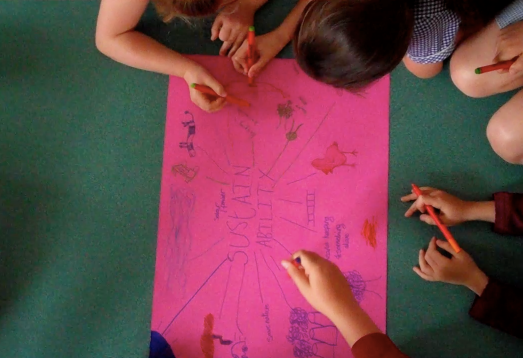
Thankfully the students got so involved that they forgot to misbehave and so the session ran as smoothly as ever. We were impressed with their ability to work together in groups and confidence in front of the camera perfecting their scenes on the first take. Take a look at one groups talking about the importance of walking and biking to school.
Thank you Surfleet Seas PS for a wonderful morning.
St Paul’s Community Primary School
Our first Cycling4SEEd film-making session ever was at a St Paul’s in London and it felt natural that our last primary school we visit was also a St Pauls, this time in Lincolnshire. We were greeted by the head teacher at the door and had a great introduction to the school from her. We started as ever with an introduction to our project and then heard about what the students had been up to in their school. This included a great Sensory Garden which had made use of a difficult middle area in the school for exploring the senses in the students. There were parts you could eat, that felt and smelt amazing, other bits used sound to stimulate also all clearly labelled for the students to explore. We also learnt about their pond and Gardening Club. We then had a lunch-time session with the Eco-Committee in the very bright Sunflower Room. It was amazing to see just how many there were in the Committee who went under the name of S.P.E.C (St Paul’s Eco-Committee). We used the different doorways to think about what had been achieved already in the school and slowly but surely built up their story of sustainability – so much had been achieved! We then thought about what could be done next and needed strengthening for S.P.E.C. An area we looked at was how students feel about their hard work when they finish primary school to head to secondary. We discussed how a link between schools would help students feel more confident about their new environment and continue their work for sustainability.
Sir John Gleed School
After visiting St Pauls and discussing the transition to secondary we had our final school session with Sir John Gleed School – one that St Paul’s students graduate into. We found ourselves in a large secondary with a class who had never worked together before. SJG is going through a transformation from being single-sex to mixed and the boys and girls were not used to sharing a classroom. So we got them to work in mixed groups and that was fun! There is much transition happening over the summer to the school building and they have been retrofitting for energy savings already. This seemed like a good time to introduce new ideas in their period of change so when we interviewed the head teacher we spoke about the good sustainability work happening in primary schools in Lincoln and how this could be encouraged further at SJG.
The students captured their ideas around the growing of food using their large green houses, healthy food, solar, recycling and energy use plus a group explored their hopes for the future.
And then we head finished our last ever session.
